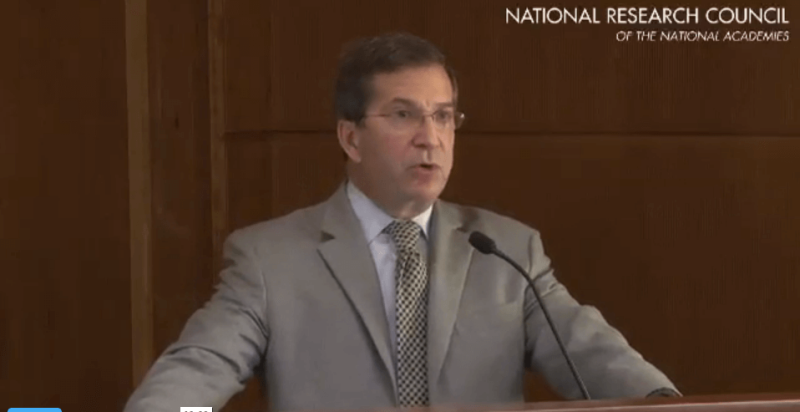The National Academy of Sciences’ National Research Council has posted videos of the presentations and discussions from the September 15-16 genetically engineered crop panel charged with preparing a report entitled A Science-Based Look a Genetically Engineered Crops. The report is schedule for publication in the spring of 2016.
Here is the NRC’s Statement of Task:
Building on and updating the concepts and questions raised in previous NRC reports addressing food safety, environmental, social, economic, regulatory, and other aspects of genetically engineered (GE) crops, an ad hoc committee will conduct a broad review of available information on GE crops in the context of the contemporary global food and agricultural system. The study will:
- Examine the history of the development and introduction of GE crops in the United States and internationally, including GE crops that were not commercialized, and the experiences of developers and producers of GE crops in different countries.
- Assess the basis of purported negative effects of GE crops and their accompanying technologies, such as poor yields, deleterious effects on human and animal health, increased use of pesticides and herbicides, the creation of “super-weeds,” reduced genetic diversity, fewer seed choices for producers, and negative impacts on farmers in developing countries and on producers of non-GE crops, and others, as appropriate.
- Assess the basis of purported benefits of GE crops and their accompanying technologies, such as reductions in pesticide use, reduced soil loss and better water quality through synergy with no-till cultivation practices, reduced crop loss from pests and weeds, increased flexibility and time for producers, reduced spoilage and mycotoxin contamination, better nutritional value potential, improved resistance to drought and salinity, and others, as appropriate.
- Review the scientific foundation of current environmental and food safety assessments for GE crops and foods and their accompanying technologies, as well as evidence of the need for and potential value of additional tests. As appropriate, the study will examine how such assessments are handled for non-GE crops and foods.
- Explore new developments in GE crop science and technology and the future opportunities and challenges those technologies may present, including the R&D, regulatory, ownership, agronomic, international and other opportunities and challenges, examined through the lens of agricultural innovation and agronomic sustainability.
In presenting its findings, the committee will indicate where there are uncertainties and information gaps about the economic, agronomic, health, safety, or other impacts of GE crops and food, using comparable information from experiences with other types of production practices, crops, and foods, for perspective where appropriate. The findings of the review should be placed in the context of the world’s current and projected food and agricultural system. The committee may recommend research or other measures to fill gaps in safety assessments, increase regulatory clarity, and improve innovation in and access to GE technology.
The committee will produce a report directed at policymakers as well as derivative products designed for a lay audience.
While there were presentations from seven scientists in relevant fields (including Gilles-Éric Séralini, whose seminal paper on the ‘dangers’ of GMOs was retracted and republished without peer review) and two academics from the fields of anthropology and sociology, most presenters were staffers from NGOs, including the only farmer group, which represented organic farmers. There were no farmers among the presenters.
Groups highly critical of GMOs were over-represented among the ten NGOs, including Food and Water Watch, ETC Group, the Consumers Union, Greenpeace, Jeffery Smith who runs the one-man Institute for Responsible Technology and both Douglas Gurian-Sherman and Bill Freese of the Center for Food Safety.
In his presentation, the Genetic Literacy Project’s Jon Entine addressed the danger of the committee giving too much weight to the scientifically marginal views of advocacy critics:
GE Crops: Meeting 1, Day 2, Jon Entine.
The committee has open registration for the next phase of its inquiry, a public webinar scheduled for October 1, 2014. Speakers include:
- Dominic Reisig, Associate Professor & Extension Specialist, North Carolina Cooperative Extension
- Mohamed Khan, Professor & Extension Sugarbeet Specialist, North Dakota State University and University of Minnesota
- Rick Kersbergen, Extension Professor, University of Maine Cooperative Extension
- Ben Beale, Extension Educator-Agricultural Sciences, University of Maryland Extension
Marc Brazeau is a writer and editor for the Genetic Literacy Project. Follow Marc on Twitter @realfoodorg
Additional resources:































